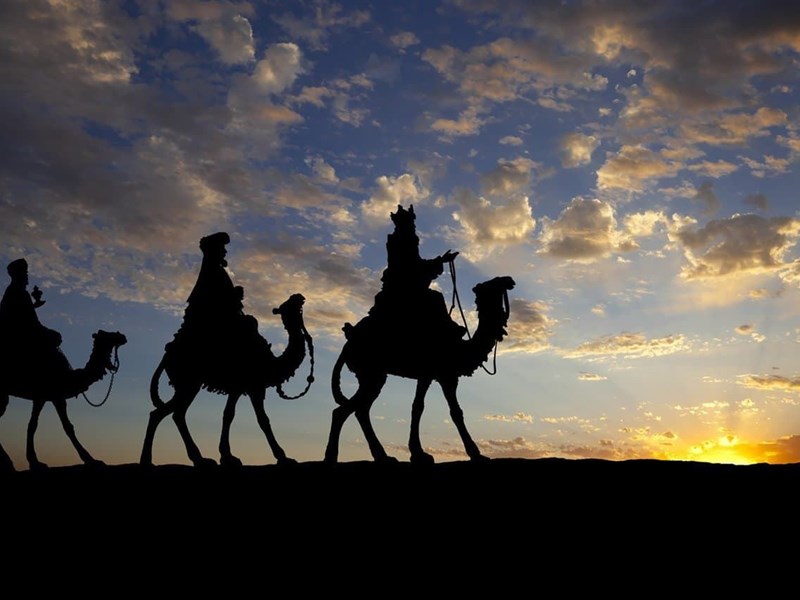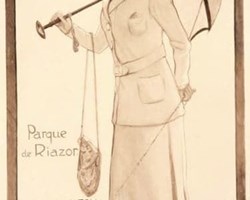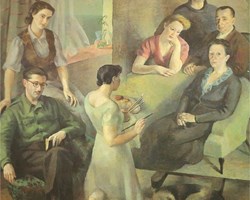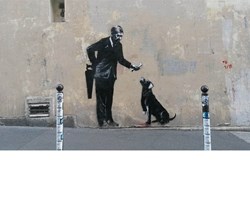
Every night of January 5 my children, Sabela and Teo, eagerly await the arrival of the three wise men and if that year they will bring them what they have asked for in their letters, and I say letters because they have been sending letters since the end of the previous Christmas , in case they forget.
This year 2022, they are no longer in such a hurry and they wait for the gifts they have asked for to be brought to them, but they are still excited that the morning of January 6 will arrive and the kings will bring what they have asked for.
ORIGIN:
In the Gospel of Saint Matthew: Adoration of the Magi. 2. 1-12.
"1 Having been born Jesus in Bethlehem from the gasps in the days of Herod the king, behold, some Magi from the eastern regions came to Jerusalem,
2 Saying, Where is the born king of the Jews? Well, we saw his star in the east, and we have come to worship him.
3 When King Herod heard this, he was troubled, and all Jerusalem with him.
4 And having summoned all the chief priests and the scribes of the people, he informed them about where the Messiah was to be born.
5 They said to him: —In Bethlehem of Judea, for thus it is written by the prophet (Mic. 5, 2):
6 And you, Bethlehem, land of Judah,
you are by no means least among the princes of Judah;
because a boss will come out of you,
who will shepherd my people Israel.
7 Then Herod, having secretly called the Magi, informed them exactly about the time when the star had appeared;
8 and sending them to Bethlehem said: - Go and take exact information about the child; and when
you have found him, give me notice, so that I can also go
and I adore him.
9 They, having heard what the king told them, set out on their way; and, behold, the star that they had seen in the east went before them, until it came to where the child was, and it stood on him.
10 When they saw the star, they rejoiced with exceeding great joy.
11 And entering the house, they saw the child with Mary his mother; and prostrating themselves on the ground they worshiped him; and opening their treasures they offered him presents, gold, frankincense and myrrh.
12 And warned by God in a dream not to return to Herod, they returned to their land by another path."
HEROD THE KING:
He is Herod I, called the Great, father of Herod Antipas, who later outwitted the Lord, and of Archelaus, who is mentioned shortly after.
WIZARDS:
In ancient Iran, originating from the magicians, and in the Avesta language "magician" meant "partaker of the gift". This gift or gift of the Good Spirit (Vohu Mano) was nothing other than the religious doctrine that Zarathusthra or Zoroaster claimed to have received from the Wise Lord. Ahura Mazdah, the supreme (or only) God of Iranian Mazdeism. Historically, the magicians called themselves disciples of Zoroaster, and they formed, not a caste similar to that of the Hindu Brahmins, but a class or profession, a school of religious philosophy, intermediate in character between the Greek philosophers and the Jewish scribes.
In Zoroaster's religious doctrine, the announcement of three "Helpers" (Saushyant) stood out, the last of which offered notable points of resemblance to the Messiah expected by the Jews. In the time of Cyrus, the conqueror of Babylon, the magicians, upon coming into contact with the Chaldeans and the Jews, could receive from one or the other influence, disastrous or beneficial, that would modify their primitive doctrines. Whether they were familiar with Balaam's prophecy or not, they could not help noticing the similarity between the messianic hope maintained by the prophets of Israel and the expectation of the great Helper announced by what was called the Iranian prophet. With this they were prepared to understand, with the light of the divine illustration, the religious significance of the King of the Jews, whose birth was to be heralded by a star. Over time the word "magician" was discredited, to the point of meaning a sorcerer, sorcerer or witch, of the type of Simon Mago of Samaria or Elymas of Cyprus. It is not this pejorative meaning that the word "magician" has in Saint Matthew, but the noble meaning it had in ancient Iran.
EASTERN REGIONS:
And this is to be the basis for the interpretation of "the eastern regions," from where the wise men came to Jerusalem.
About these "eastern regions" there are two main opinions that deserve to be taken into consideration. According to some, magicians come from Arabia; according to others, from Persia. It is convenient to examine the grounds on which each of the two opinions rests.
In favor of Arabia is the authority of Saint Justin and Saint Epiphanius, both Palestinians, who perhaps relied on some local tradition. Tertullian is added to them. Respectable is this authority, and it would deserve credit, if it were not counterbalanced by a greater one. The word "east" meant then, and also now, the region lying east of the Jordan and the Dead Sea, where the kingdom of the Nabataeans was located. But this meaning, although usual or current, was not exclusive. In the book of Numbers (23, 7; cf. 22, 5) east is the country of Aram; and in Isaiah (41, 2) it is Persia. And precisely the current use of the word at that time could have led Saint Justin and Saint Epiphanius, without any other foundation, to believe that the east from which the magicians came was Arabia. It also insists on the gifts offered by the magicians: gold, incense and myrrh, characteristic of Arabia. But trade was in charge of exporting them to other countries, where, for this very reason, they were considered more precious. To the E. of the Dead Sea was Moab, where Balaam had predicted that a star of Jacob would be born (Num. 24, 17): a prophecy that could have served as a key to the magicians to understand the messianic significance of the star they saw. But in the prophecy the star is not a star, but metaphorically the Messiah himself. And Saint Matthew does not make the slightest allusion to this prophecy. And in the assumption
problematic that the knowledge of the prophecy could have inspired the magi to go to Jerusalem, well
The Babylonians and the Persians were able to know this prophecy from the times of Nebuchadnezzar and Cyrus, when they came into contact with the Jews.
But apart from these particular objections, there are two more serious ones that oppose the opinion of Arabia. Firstly, were there in Arabia "magicians" who appear in the narrative of Saint Matthew, wise and religious men, who were not vulgar soothsayers? In addition, the designation of Arabia as the homeland of the magicians could come from the literalist interpretation or application of Psalm 71 "the kings of the Arabs and Sabah will offer gifts" (71,10), "and they will be given the gold of Arabia" (71,15). But if the kingship of the Magi is rightly dismissed, for example, as arising from an overly literal interpretation of Biblical passages, for the same reason the view of Arabia can logically be rejected as equally inspired by an inadequate interpretation of Psalm 71.
Of greater weight seem the reasons in favor of Persia. First, the authority of the most ancient Fathers. As representatives of the Alexandrian school are Clemente, Orígenes and San Cirilo; as representatives of the school of Antioch, Diodorus of Tarsus and Saint John Chrysostom; represents the school of Nisibe and Edesa San Efrén; the two Spanish poets, Juveneo and Prudencio, are in favor of Persia. And this has been the most general opinion of ecclesiastical writers ever since. To this documentary tradition we must add the iconographic one: probably the fresco of Saint Priscilla from the 2nd century and certainly the mosaic from the Constantinian basilica of Bethlehem, which represent the Magi dressed in Persian style. This hypothesis perfectly explains the facts: a) the dignified, non-pejorative sense in which the word "magician" is used; b) the profound religiosity shown by the magicians in the evangelical narration; c) the prior knowledge they may have had of the advent of the Messiah, which served as a preparation for the divine illustration; d) the ignorance that they show to have of the political situation of Judea, improbable ignorance in an Easterner of the regions that fall immediately to the E. of the Jordan or the Dead Sea; e) probably also the sign of the star, well suited to wise men dedicated to the observation of the stars, who could have been the magicians of Persia, after having come into contact with the Chaldeans, and who is not easy to suppose in Arabia . The difficulty that has been asserted against this hypothesis, the great diversity between the Persian language of the Magi and the Aramaic language of the Jews, does not have great force, if we remember the universal diffusion of Greek, from the conquests of Alexander the Great. , mainly among the educated people, which were the magicians.
Other legendary and even purely fantastic data were added to these historical data over time.
From the sixth century, the belief spread that the magicians were kings; their names were known and even the age and external appearance of each one; it was known that Melchor, an old man with a white beard and long hair, dressed in hyacinth, had offered the gold; that Gaspar, a beardless and ruddy young man, dressed in a red tunic, had offered the incense; that Baltasar, dark and bearded, dressed in a red tunic, had offered myrrh. The most credible evangelical data referring to the magicians is that there were three.
In fact, in the oldest paintings there are ordinarily three, as long as the itch for symmetry does not make it necessary to reduce them to two or extend them to four.
And this number could be accepted, if the suspicion of having as its origin the ternary number of the gifts offered by the magicians did not fall upon him.
2 "THE KING OF THE JEWS":
He was for the magicians, not a vulgar king, as one of King Herod's sons could be, but the Messiah, who at that time was universally expected as a restorer or initiator of a new era of prosperity. The dispersion of the Jews contributed to this universal belief, which the magicians naturally related to the expectation of the great Helper, announced by their teacher Zoroaster.
"HIS STAR":
"His star": there are three main opinions about the star seen by magicians. Kepler supposed that it was the conjunction of the three planets Saturn, Jupiter and Mars, which occurred in the year 747 of Rome, 7 before the Christian era.
Origins, and many others later, have supposed that it was a comet, perhaps the famous Halley's Comet, which was seen in the year 12 before our era. Others, finally, believe that it was a luminous meteor, formed extraordinarily by God to announce
the advent of the great awaited King. The movement from N. to S., from Jerusalem to Bethlehem, which the Evangelist later attributes to the star, only has an adequate explanation in the third hypothesis. And the fact that God intervened extraordinarily with this miracle will not seem so strange or incredible to those who remember the extraordinary solar phenomena that were recently seen in Fatima. In any case, this phenomenon was for the magicians “the star of the Messiah”. How? First of all by a divine illustration, with which the magicians knew that the appearance of the star was the sign given by God of the advent of the Messiah. The natural environment or the occasion used by divine providence could very well have been the general expectation of the Messiah, which the magicians would relate to Zoroaster's prediction of the great Helper, and also perhaps the propensity of the magicians to relate celestial phenomena. with extraordinary historical events. Nor is it perhaps unlikely that they knew and understood in this sense the prophecy of Balaam (Num. 24, 17):
A star comes out of Jacob,
a center arises from Israel.
"IN THE EAST:
Depending on the various meanings of the word "east" (in Greek "anatolé"), the interpretation of the entire phrase "we saw his star in the east" can be quite different. «Orienten can have:
I. Local Sense:
1) direction E. (cardinal point);
2) land or eastern country;
3) eastern part of the celestial sphere;
II. Temporary Sense:
Raise or departure of the stars.
Hence the following possible interpretations:
A. The complement «in the east» can logically affect the subject of the sentence, with two different nuances:
a) "we, when we were in eastern lands, saw the star" (I, 2);
b) more generally, "we inhabitants of the east saw the star" (I, 2).
B. The indirect object «in the east» can affect the direct object «star», in three different ways:
a) "we saw the star appear in the eastern part of the sky" (I, 3);
b) "we saw it in the E direction." (I, 1);
c) "we saw the star at birth or appear on the horizon" (II). Of these interpretations, the last (B, c) expresses unnecessary clarifications and not indicated by the Evangelist. The subsequent repetition of the phrase "the star they had seen in the east" (2, 9), with the same meaning, is even more refractory to these details. The previous interpretation (B, b), or also contains unnecessary precisions and not expressed by the Evangelist, or coincides with the previous one (B, a). This interpretation (B, a), taken in an indeterminate sense, is not opposed to the first interpretation (A, a, or A, b) in any of its two nuances, rather it is its natural complement. Therefore, we must adhere to this first interpretation, in the more general sense of "we saw the inhabitants of the eastern lands shine a star in the sky of those regions."
"We have come to adore him": it is not entirely certain, but neither is it implausible, that the magi knew or glimpsed the divinity of the Messiah. In any case, their worship is religious in character, and not merely political or human.
4 "KING HEROD WAS DISTURBED":
"King Herod was disturbed": it is not surprising that the intruding tyrant was disturbed by the news that a dangerous competitor had been born to his dynasty, not very secure on the throne of Israel. It seems more strange, at first sight, that "all Jerusalem" was also disturbed. Without a doubt, knowing the cruelty of Herod. some bloody reprisals were feared, of which they might be victims.
The tyrant, as foxy as he was bloodthirsty, whether or not he believed in the messianic prophecies, surreptitiously proposed to deliver an accurate blow that would once and for all put an end to that real or imaginary competitor. Understanding that the king sought by the magicians could only be the Messiah awaited by the Jews, and eager to know exactly the place where he might have been born, he summoned those who could best know, "the priests and scribes of the people." ». He would doubtless think that, if this birth were real, he would know where to strike, to end once and for all those annoying hopes of the Jews; and if all this turned out to be pure fantasy, there would be no reason to worry about the news from the wizards. Once the priests and scribes had gathered in his presence, pretending to take the news spread seriously, "they were informed about where the Messiah was to be born."
5 "IN BETHLEHEM":
"In Bethlehem": the Jews themselves recognize the messianic character of Micah's prophecy. Detailed prophecies, such as this one regarding the place of birth, were to serve for the personal identification of the Messiah.
6 "AMONG THE PRINCES OF JUDAH":
"Among the princes of Judah": in the assemblies in which the chiefs of the cities meet, Bethlehem will be, due to the chief who represents it, the most important of all. The evangelical text of the prophecy differs in some points from the Masoretic text, with which the version of the Seventy substantially coincides.
The Hebrew text reads: And you, Bethlehem Efrata, small to be counted among the thousands of Judah, from you will come out for me the one who will dominate over Israel. Disregarding other divergences that do not affect the meaning, the change in Bethlehem is striking, which, small in the mouth of the prophet, appears large in the lips of the priests and scribes or of Saint Matthew. For now, between that smallness and this greatness there is no contradiction, since smallness is material and greatness is moral. The reason for the textual change in the prophecy is also manifest: to highlight the moral greatness of Bethlehem (implicit in the original text), as it is the cradle of the Messiah. What is no longer so clear is the origin of such a change. Was it the work of the same scribes who recited the prophecy, or of Saint Matthew, who freely reproduced it? And is it true that the change had not already occurred previously, and was recorded in some variant that has not come down to us? Everything is possible. What is important is the legitimacy of the literal change, which, far from disfiguring it, gives greater relief to the fundamental meaning of the prophecy.
7 "S REPORTED ON THEM ACCURATELY":
"They were informed exactly": this data, related to what is said later (verse 16), is extremely important to establish the chronology of the birth of Jesus, at least in the well-founded hypothesis that the appearance of the star coincided with the birth of the Savior.
8 "SO THAT I ALSO GO AND WORSHIP HIM":
«So that I too can go and adore him»: Saint Fulgencio of Ruspe rebuked Herod with just reason: «The blood of the Innocents, which you cruelly spilled, testifies to what you intended to do with this Child» (ML 65, 734- 735).
It is not lawful to stop considering the great lessons that shine in all this fact. Two are mainly. The first refers to the loving providence of God. In order to bring the magi to Bethlehem, God could make the star reappear before they reached Jerusalem, just as he did reappear immediately afterward. He preferred, however, that the great enemies of the authentic Messiah intervene, as unconscious instruments of divine designs: Herod, who was going to make an attempt on his life, and the priests and scribes, who would later take it from him. The great truth had to shine that "God coordinates all his actions for the good of those who love him" (Rom. 8. 28): and in order to do so, he channels and directs all the actions of those who hate God and his friends. of God. What to the magicians might have seemed a momentary tribulation or desolation, fully compensated shortly after, was actually a gift of the most loving providence of the heavenly Father. And Herod's black plans, by summoning the priests and scribes, to destroy the Child and the magicians, had no other effect than to make it easier for the magicians to find and worship the King of the Jews they were looking for. There is no advice of man that prevails against the advice of God, even better. that does not serve for the achievement of divine designs. The other lesson is more austere. This fact is a terrifying symbol of the incredulity of the Jewish leaders, not only opposed to the faith and docility of the Gentiles, but placed at the service of it. There were those priests and scribes with the prophetic Scriptures in their hands, showing the Messiah of Israel to the Gentiles and presenting him to their acknowledgment and adoration, without taking a step to seek him out, recognize him and adore him: mute milestones, which, motionless, point to the way to others. Desolate vision of Jewish unbelief! But it is also a consoling vision for the Christian Church, which in the call of the Magi contemplates with joy the vocation of the Gentiles, that is, of the universality of men to the faith and adoration of God and of his Christ.
9 "THE STAR... WENT AHEAD... STOPPED":
"The star... went ahead... stopped": such expressions can hardly be explained except in the hypothesis that the star was a luminous meteor that moved a short distance from the earth.
10 "THIS EXTRAORDINARY CONSOLATION GIVEN BY GOD TO THE WIZARDS":
This extraordinary consolation given by God to magicians, when it might seem least necessary, teaches a very important truth in the spiritual life, namely, that if consolation is sometimes given to soften the harshness and bitterness of virtue Other times, however, it is given only as a reward for virtue already practiced. It is that the consolation that follows the virtuous act does not diminish its merit, already definitively acquired: given, however, in advance, it could easily diminish the karats of its perfection and even cloud the purity of the intention. The man is very prone to search for himself, even in the practice of virtue.
11 "IN THE HOUSE":
"In the house": it seems, therefore, that, once the influx of people had passed, motivated by the census, Saint Joseph was able to find a "house" in Bethlehem, where he moved, leaving the cave in which the Savior was born . This assumption becomes more plausible if, according to the expression "from two years and under" (vers. 16), it is admitted that at the arrival of the Magi, more than a year had elapsed since the birth of the Child.
"WITH MARY HIS MOTHER":
"With Mary his mother": Jesus is not found except with Mary his Mother, associated by God with the person of the Son and his work
savior.
"GOLD, INCENSE AND MYRRH":
"Gold, frankincense and myrrh": it is common, among the Holy Fathers, to attribute symbolic meaning to these gifts: gold symbolizes the royalty of Jesus; the incense, his divinity; myrrh, his humanity or mortality.
12 "WARNED BY GOD":
"Warned by God": once again the providence of God intervenes extraordinarily, who wanted to free the unwary magicians from falling into the networks that the cunning perversity of the tyrant had prepared for them.
"IN DREAMS":
«In dreams»: during the dream God spoke to them in such a way that they understood that it was God who manifested his will to them. And they meekly obeyed. This communication of God with the spirit of the magicians is proof that before, when the star appeared, God gave them to understand clearly, or by dreams, as now, or in another way, what the star meant.
"BY ANOTHER WAY":
"By another way," supposing they entered Jerusalem from the N., they now took yet another way to the S. Entering the desert that stretches to the E. of Bethlehem, in a few hours they were able to reach the Dead Sea and Jordan, and from there "they returned to their land" (Bover, José m. 1946, pp. 47-61).
BIBLIOGRAPHY:
- Bover, Jose M. (1946). The New Testament translated from the Greek and annotated. Volume I. The Gospel of Saint Matthew. Editorial Balmes, Barcelona.
- JM SADURNI
Collaborator.
Writer for the National Geographic History website specializing in contemporary history, biographies and issues related to war conflicts.
https://historia.nationalgeographic.com.es/a/origen-tradicion-reyes-magos-y-regalos_15037




